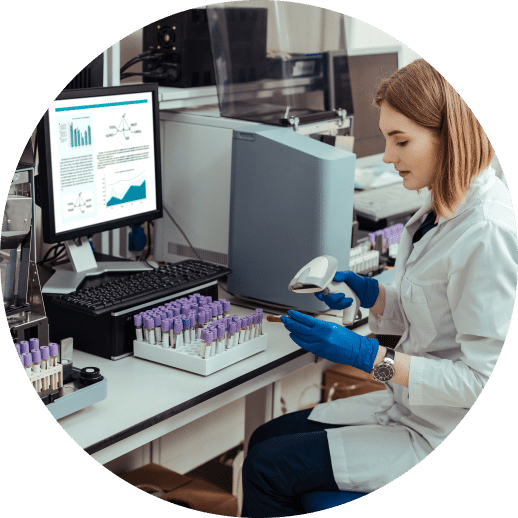Consent
What your patients need to know

An appropriate discussion of genomic testing and the possible implications for a patient and their family members must take place before any genomic testing is requested, other than certain (non whole genome sequencing (WGS)) tests on cancer tissue.
It is the referring clinician’s responsibility to ensure that the patient/carer knows the purpose of the test and that the sample may be stored for future diagnostic testing.
For all genomic tests, a record of discussion must be retained within the patient record. At this time, different tests require different record of discussion forms (see more information below).
For more information please view the Consent and Confidentiality in Genomic Medicine guidelines from the Joint Committee on Medical Genetics.
Protecting patient information
We follow Trust policies and Caldicott principles to safeguard all patient information. DNA from all referrals is currently retained for quality assurance purposes and may be used anonymously for the development of new tests unless consent for this is expressly denied.
Recording consent for most genetic tests (non WGS)
For all genetic tests, it is the responsibility of the referring clinician to ensure that patient consent is obtained before sending the sample to the Laboratory for testing. The Record of Discussion form for non-Whole Genome Sequencing results is below. The referring clinician should keep a copy of the signed form on the patient record (do not send this Record of Discussion form to the laboratory). If the appointment is conducted remotely, the Record of Discussion form can be completed virtually; tick the appropriate box at the end of the form to indicate remote consent.
Recording consent for WGS
For all whole genome sequencing (WGS) tests, including those for solid tumours, there are specific consent forms which need to be completed. The WGS Record of Discussion form must be used and sent alongside the referral form. You may be need to complete:
- Consultee Declaration Form – This should be completed if a relative, friend or advocate needs to make the decision on behalf of someone who lacks the capacity.
A consultee is someone who will only consider the likely views and interests of the person who lacks capacity. They must set aside their own personal views about participating in research and consider the person they represent. A consultee cannot be part of the person’s NHS clinical team or anyone else acting in a professional or paid capacity (e.g. a person’s solicitor). - Young Assent Form – This should be completed by the patient if they are between the age of 6 and 15, to ensure they are informed about their involvement in the National Genomic Research Library (NGRL).
To access the relevant forms, please visit our WGS page.
The National Genomic Research Library (NGRL)
The NGRL is a comprehensive database that enables approved researchers to access de-identified genomic data, health data and samples. It is a partnership between NHS England and NHS Improvement (NHSE/I) and Genomics England. This central resource, linked to the GMS, aims to provide access to research opportunities to improve diagnoses and our understanding of health and disease, as well as accelerate the development of new biomarkers, diagnostics and therapeutic agents.
Please do try to discuss consent for research with your patients. Experience has shown that many people feel very positive about helping further research and using this kind of anonymised data can prove invaluable for researchers and often results in significant patient benefit.
The record of discussion form for Whole Genome Sequencing documents whether or not patients consent to their data included in the NGRL, for use in research, and to be re-contacted regarding relevant research projects in the future. Patients’ choices regarding the NGRL can be recorded on page 3 of the record of discussion form, and, for those who lack capacity, on the consultee declaration form.
For more information about the NGRL and how to have conversations about this with patients, please visit HEE’s website.
Hotline to support patients considering sharing their data with the NGRL
To help make the WGS/NGRL pathway more manageable and potentially reduce the workload of clinicians, a hotline service targeting patients who need more time to consider whether they would like to share their data with the NGRL is available in the North Thames.
The hotline is open Monday to Friday 9am-5pm and is overseen by the Genomics Associates at Great Ormond Street Hospital. This team are available to consent WGS patients for the NGRL and answer questions they may have in relation to their participation. Please note, this team cannot complete clinical consent for WGS. All paperwork for WGS must be completed by the clinician so that testing is not delayed.
If your patient would like to utilise this hotline, please direct them to call 0207 762 6870 or email the team at gos-tr.NTGenomicsAssociate@nhs.net